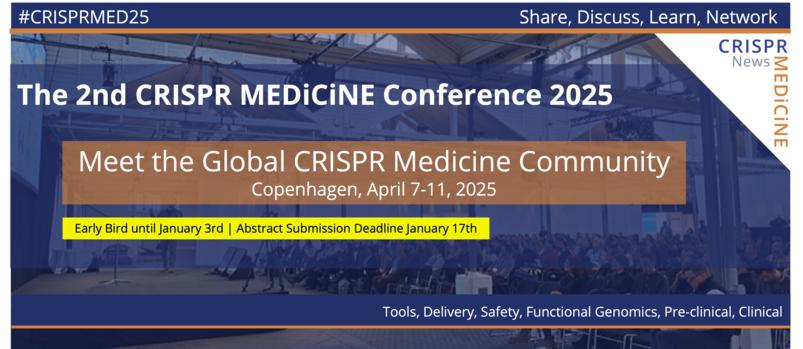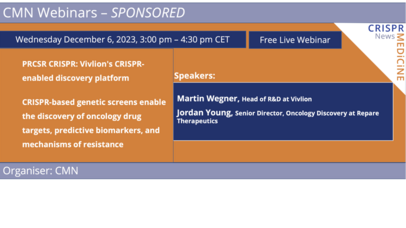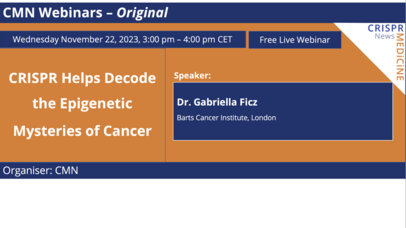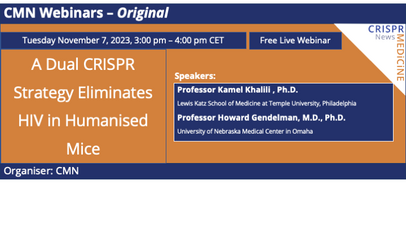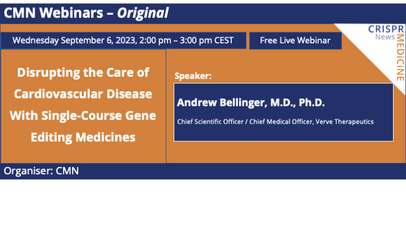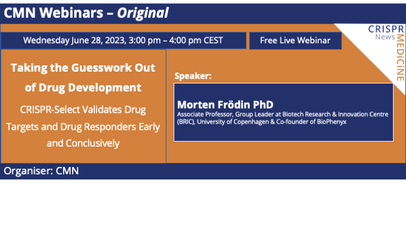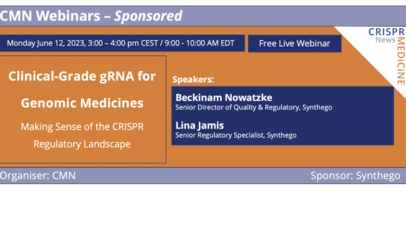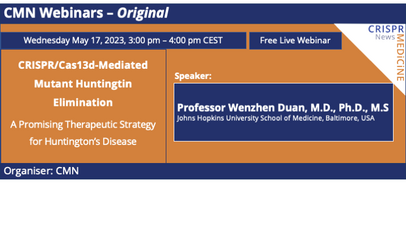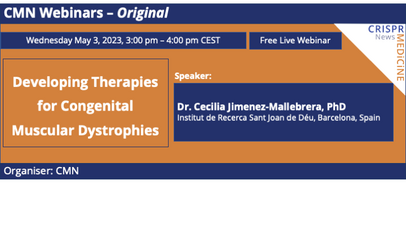Webinar
CRISPR & Gene Drives: New Tools Being Developed in the Effort Against Malaria | Wed. November 6, 2024 | 3:00 pm–6:00 pm CET / 9:00 am–12:00 pm ET | Free CMN Live Webinar
On-demand Webinar is available - Follow this link
CRISPR & Gene Drives: New Tools Being Developed in the Effort Against Malaria
Given the global spread of vector-borne disease (VBD) and the implications this could have on public health, CRISPR Medicine News is hosting this virtual event to raise awareness about VBD with a special focus on malaria. During the event, four leading scientists will provide an up-to-date overview on the status of VBD and discuss how genetic control strategies based on gene drives and CRISPR can and are being used to develop solutions. The event will include four presentations as well as a panel discussion.
In this symposium, you will learn about:
- The impact of vector-borne diseases in Africa, with a focus on malaria. You will hear about what is currently being done in the field to control the vector in Africa, as well as the challenges faced.
- The impact of vector-borne diseases in Europe and beyond. Malaria is no longer just an African problem, but how serious is the situation elsewhere? How is malaria currently handled outside of Africa, and what would global spread of the vector mean? What can we learn from Africa?
- The potential of gene drives and gene-editing strategies including CRISPR to control mosquitos. What has been achieved in this field so far?
- Introduction to GeneConvene and the FNIH, the need for informed decision making when assessing advanced technology, and collaborative, interdisciplinary partnerships.
Webinar Programme (CET time zone):
15.00 Welcome and introduction by CRISPR Medicine News
15.10 Jonathan Kayondo: Novel Genetic Based Vector Control & Malaria eradication: Technology development needs in Africa
15.50 Dr. Federica Bernardini: Expanding the Toolkit for Genetic Biocontrol of the Malaria Mosquito Anopheles gambiae
16.30 Dr. Omar Akbari: CRISPR-Based Control of Insect-Borne Diseases
17.10 J. Royden Saah: Supporting Informed, Rigorous, and Just Decision Making: The Approaching Technology of Gene Drive Mosquitoes for Malaria Control
17.20 Panel discussion with all four speakers
17.55 Close by CRISPR Medicine News
This special symposium is co-organised with Dr. Vincenzo Di Donato (ZeClinics and TReND in Africa), Davis Eban (University of Lagos and I-Gene Life Science Foundation), and Dr. Thomas Auer (University of Fribourg, Switzerland and TReND in Africa).
About the speakers
J. Royden Saah, Foundation for the National Institutes of Health, Maryland, US
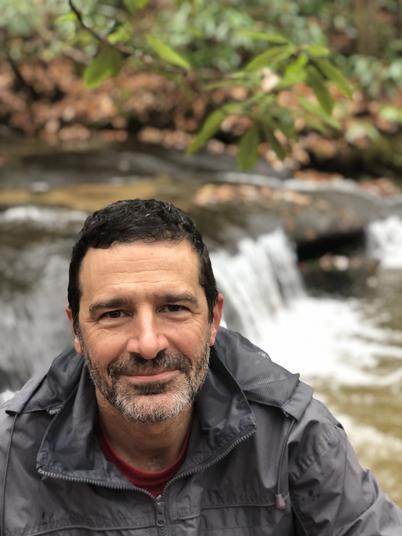
Supporting Informed, Rigorous, and Just Decision Making: The Approaching Technology of Gene Drive Mosquitoes for Malaria Control
Royden is a passionate advocate for collaboration across diverse fields, from scientific innovation to ecosystem resilience, human health, and social justice. As a Senior Technical Expert for Scientific Partnerships at GeneConvene, he fosters cooperation among governmental, academic, non-governmental, and international organisations. At GeneConvene, his goal is to enhance knowledge and capacity for informed and equitable decision-making in jurisdictions considering genetically-modified mosquitoes to reduce malaria-related illness and death.
With many years of experience coordinating an interdisciplinary program focused on developing genetic biocontrol tools to prevent species extinction on islands, Royden excels in managing complex initiatives. He successfully brought together governments, universities, and non-profits from the US, Australia, and New Zealand to form The Genetic Biocontrol of Invasive Rodents Consortium (GBIRd). Notably, GBIRd emphasises equality among disciplines, treating social scientists, ecologists, mathematical modelers, and regulatory experts as equals alongside geneticists in their ground-breaking work.
Before his environmental efforts, Royden spent over a decade leading multiple laboratories in the North Carolina Division of Public Health, dedicated to epidemic/pandemic prevention, detection, and response. He collaborated with the Guyana Ministry of Health, CDC, and the Association of Public Health Labs to enhance infectious disease detection and response capabilities from 2008 to 2014. Additionally, he worked with Médecins Sans Frontières (MSF) in Liberia, establishing biosafety processes and helping to construct a paediatric hospital that opened in March 2015. In 2020, he volunteered with WHO’s Global Outbreak Alert and Response Network (GOARN) to improve COVID-19 detection and understanding in Papua New Guinea.
Jonathan Kayondo, Target Malaria Uganda
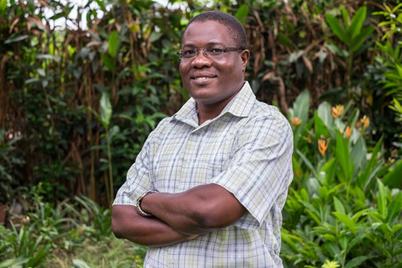
Novel Genetic Based Vector Control & Malaria eradication: Technology development needs in Africa
Jonathan Kayondo is a Ugandan Scientist based at the Uganda Virus Research Institute, heading the department of Vector Biology/Entomology and the Core Molecular Biology and Bioinformatics core facility. He holds a B.Sc. in biochemistry, chemistry and molecular genetics from Makerere University, Uganda and a PhD in vector biology from the University of Notre Dame, USA. His research encompasses laboratory and field investigations on disease vectors and pathogens with a focus on the genetics of malaria and arbo-viral disease transmitting mosquitoes and viruses. Over the years, he has studied the main malaria transmitting mosquitoes, Arbo-viral mosquito vectors, and genomic evolution of HIV drug resistance in Uganda.
Vector-borne diseases such as malaria and arbo-viral infections remain great public health concerns in Uganda and sub-Saharan Africa in general. Jonathan guides Uganda Virus Research Institute's (UVRI) vector biology scientific direction, which is aimed at obtaining a better understanding of the local mosquito populations in order to inform current vector control strategies, and the development of alternative approaches to complement existing interventions. He is also a Principal Investigator (PI) for Target Malaria in Uganda, a multi-disciplinary research consortium focused on developing novel genetic gene drive-based technologies for malaria vector control. In addition, he oversees departmental work exploring the isolation and harnessing of candidate microbes as potential entomo-pathogens for malaria mosquito control and the development of genomic tools for malaria mosquito molecular surveillance applications.
Jonathan has over the years been and continues to be involved in various capacity building networks at UVRI as lead or partner on: the H3ABioNet, a consortium for bioinformatics infrastructure and expertise development on the African continent, THRiVE and MUII consortia for health research capacity building in the region and Uganda, respectively, eLwazi, a collaborative data science platform being developed for finding and accessing data, tools and workflows for carrying out analyses of various data types, and the African Consortium in Modeling for Effective Vector Control. Jonathan’s other key engagements include academic training, and mentorship with over twelve graduate students supervised to date.
Jonathan’s work receives funding from various sources including the Government of Uganda, the Bill and Melinda Gates Foundation, the NIH, and others. Jonathan's work has resulted in more than 50 printed works including 30 peer-reviewed publications with nine as first or corresponding author.
Dr. Federica Bernardini, Research Associate | Imperial College London, United Kingdom
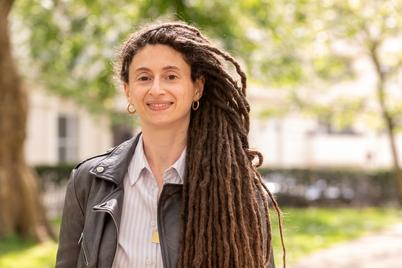
Expanding the Toolkit for Genetic Biocontrol of the Malaria Mosquito Anopheles gambiae
Federica Bernardini is a Research Associate at Imperial College London, working on novel strategies to control the mosquito vector of human malaria. Since the start of their PhD studies at Imperial, Federica has been successfully working on the development of synthetic biology approaches for the genetic control of malaria-transmitting mosquitoes. These novel tools show great potential for the elimination of invasive species, pathogen reservoirs or disease vectors, and the results of Federica and colleagues’ research were published in prestigious scientific journals generating extraordinary interest in the field. Currently, Federica’s interest focuses on the development of self-sustaining and self-limiting strategies for the suppression of Anopheles mosquitoes. Federica is significantly involved in the scientific activities within Target Malaria, a not-for-profit research consortium mainly funded by the Bill and Melinda Gates foundation. The consortium aims at developing and implementing cost-effective and sustainable genetic technologies to control mosquitoes and reduce malaria transmission and is currently actively working in Burkina Faso, Ghana and Uganda.
In 2024, Federica joined the Malaria Technical Expert Collective (MTEC), a group derived from Malaria No More UK. MTEC aims to bring together researchers, policymakers and health advocates who share the goal of working to end malaria.
Omar Akbari, Professor at University of California San Diego (UCSD)
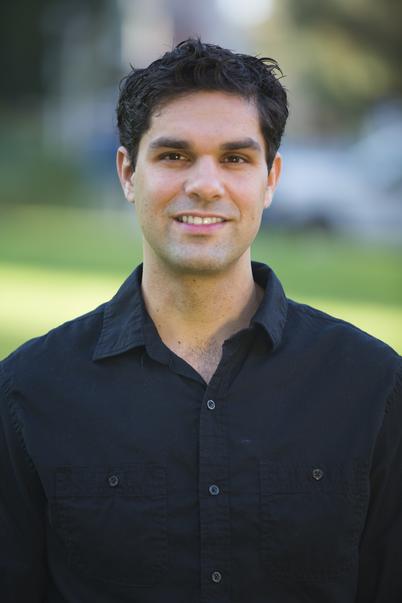
CRISPR-Based Control of Insect-Borne Diseases
Omar Akbari received a B.S./M.S. in Biotechnology from the University of Nevada, Reno in May 2005. In December of 2008, he received a Ph.D. in Cell and Molecular Biology from the University of Nevada, Reno where he studied transcriptional regulation during development while working with professors Robert Drewell and Chi-Yun Pai. He then joined the laboratory of professor Bruce A. Hay at the California Institute of Technology as a senior postdoctoral scholar where he used principles of synthetic biology to develop population control technologies for animals. In 2015, he became an Assistant Professor of Entomology in the Center for Infectious Disease Vector Research (CIDVR) at the University of California, Riverside. In Autumn 2017, he joined the faculty as an Assistant Professor in the Department of Cell and Developmental Biology, within the School of Biological Sciences, at the University of California, San Diego. In 2018, he co-founded Agragene a biotechnology-based startup. In 2019, he was promoted to Associate Professor (with Tenure), followed by a promotion to Professor in 2021. In 2022, he co-founded Synvect, a biotechnology-based startup in San Diego, CA.
Read our earlier interview with Professor Akbari here.
About the co-organisers
Dr. Vincenzo Di Donato, ZeClinics and TReND in Africa
Vincenzo Di Donato is an Italian researcher, specialising in molecular biology and human disease modelling. During his PhD at the Curie Institute in Paris, he focused on developing novel gene-editing technologies using the zebrafish model. At ZeClinics, a zebrafish-based biotech company, he continued optimising gene-editing tools for functional genomics, first as project manager and later as Head of Genetics. Since 2020, in his role as Scientific Director, he has collaborated in international consortia to develop high-throughput platforms for testing gene therapy approaches. Additionally, since 2021, he has supported the implementation of CRISPR/Cas9 in African laboratories through the charity TReND in Africa. Vincenzo also holds a master’s in NGO management and is deeply committed to educational initiatives in low- and middle-income countries.
Davis Eban, University of Lagos and I-Gene Life Science Foundation
Davis Eban is a young researcher from the University of Lagos and the founder of the I-Gene Life Science Foundation which focuses on engaging students through interactive science fairs, career talks, and informative webinars. Davis is extremely interested in modern science and technology, especially CRISPR technology. His commitment to CRISPR studies has made him present his work and participate in prestigious global platforms like the Cold Spring Harbor Laboratory, in New York, USA, and the CRISPR Medicine News Conference in Copenhagen, Denmark. His passion for research is further evidenced by being nominated as one of the 10 young scientists from across the world to participate in the InteRussia 1st Agrobiotechnology Fellowship at the Skoltech Institute sponsored by Gocherkov Fund. Davis is passionate about inspiring the next generation of scientists and using CRISPR technology to impact the world positively.
Dr. Thomas Auer, University of Fribourg, Switzerland and TReND in Africa
Thomas Auer is an Assistant Professor in Biology at the University of Fribourg, Switzerland and Executive Co-Director of the charity TReND in Africa. In his research, he is using genetic engineering to study chemosensory behaviours and their evolution in insects. In 2016 he established a genome editing program with TReND in Africa to democratize the use and build capacity for genetic research in Africa. Since then, he has been organizing hands-on workshops to train scientist in different African countries and is strongly committed to empowering researchers through education
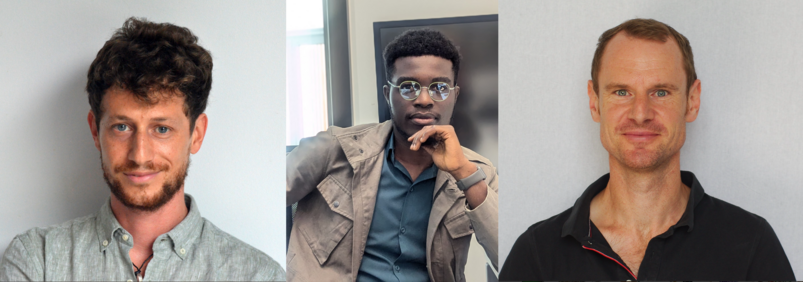
Sign up to the CRISPRMED special symposium
CRISPR & Gene Drives: New Tools Being Developed in the Effort Against Malaria | Wed. November 6, 2024 | 3:00 pm – 6:00 pm CET / 9:00 am – 12:00 pm ET
CMN Webinars - Your Gateway to CRISPR Medicine
If you have any questions or request for webinars, please contact us at: sales@crisprmedicinenews.com
Future CMN Webinars will be listed here.
Always stay updated - Sign up to weekly newsletter.
